The next trip I'll tell you about was a couple of months ago, and it's another really good one! In all truth, all of our trips are good though. Living here, there is no shortage of cool things to see and places to go!
This was the first trip we took after our miscarriage. Rich and I just needed to get away for a couple of days, so he planned this trip to the Czech Republic and I had no idea where we were going. I didn't ask. And in all honesty, I didn't care where we went as long as we were together. So we took off!
We left Wiesbaden and headed east. We crossed into the Czech Republic--new country for both of us! Woohoo! Just before reaching Prague, Rich took us on a little detour to a castle called Hrad Karlštejn! Hrad means castle in Czech, and I believe Karlštejn is pronounced like Karl-stein, but please don't quote me on this.
 |
| No surprise...I got distracted! |
 |
| I stood on a very unstable drainage pipe thingy to get this shot. |
From here we drove into Prague, or Praha to the Czechs, to check into our hotel. And this, once again, is why I do not question my husband when he plans trips. He found another boat hotel!!
 |
| Boat Hotel Matylda. We stayed on the lower level of this boat, with a view of the river! |
 |
| Our view from the room. |
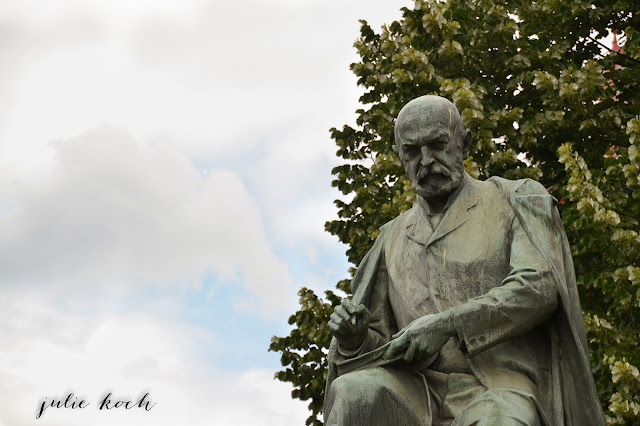 |
| Not sure who this guy is! |
Time to explore Prague!


 |
| View of Prague Castle and the Charles Bridge |
 |
| Night gym? Never heard it called that before! |
 |
| Rich got held up by this guy outside the famous Ice Pub! Ahhhhh! |
 |
| Entrance to the Charles Bridge |
 |
| Ceiling of the entrance. |
 |
| Again, beautiful crucifixes here. |
Construction on the Charles Bridge began in 1357, ordered by King Charles IV (same guy who built Hrad Karlštejn). It's believed that Charles IV laid the first stone himself. Originally called the Stone Bridge or Prague Bridge, it was the only way to cross the Vltava River until 1841. It's been known as the Charles Bridge since 1870, and there are 30 statues that line it.
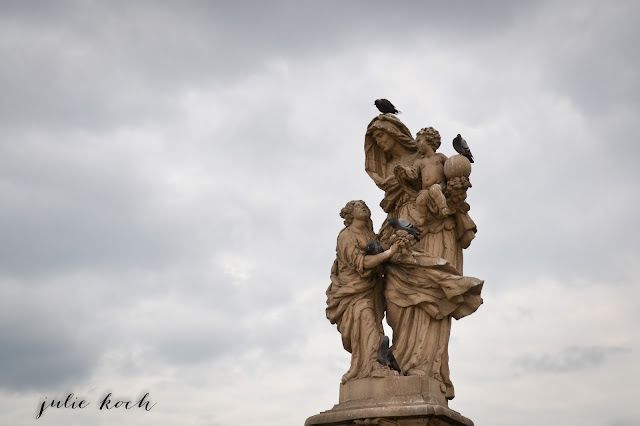 |
| Pigeon Head! |
Other than statues, the bridge is also completely covered in vendors selling everything from magnets to jewelry to caricatures. Soooo many tourists plus soooo many vendors makes crossing this bridge tricky.
We finally made it to the other side!
We stopped at a little vendor on the street and Rich enjoyed some traditional trdelník, a sweet hollow pastry that originated in Transylvania. I didn't have any since it had cinnamon on it, and I do not do cinnamon ever. I did, however, enjoy a real fruit smoothie with pineapple, strawberry, and orange. Seriously delicious!
We continued up the hill toward the Prague Castle, which afforded us some amazing views of the city!
Prague Castle is believed to have been begun around 880 A.D., earning its place in the Guiness Book of World Records as the world's largest ancient castle. It's also a UNESCO World Heritage Site, one of many that we've visited. During the rule of Charles IV, the castle became the seat of the Holy Roman Empire. Even the Habsburgs occupied it at one time during the Renaissance. Today it is the office and residence of the President of the Czech Republic. Unfortunately, there was a lot of maintenance going on during our visit, so the façade was not very pretty.
 |
| There were no guards here, so Rich thought he'd fill in. But he got confused. |
Inside the castle's outer walls is St. Vitus Cathedral, which was begun in 1344. It is the largest cathedral in the Czech Republic.
Gonna just take a minute here to reiterate...this cathedral was built in 1344 A.D. That's nearly 700 years ago, without any of the modern tools we have today. And just look at the detailed architecture. I wish I could bring each one of you here with me and we'd stand beside these buildings and just stare together. Amazing.
 |
| This guy...I just love him so dang much! |
After leaving the cathedral, we ran into these guys. They're castle guards, but we're not sure what they were doing other than marching around the grounds.
And then there was this guy. Yes, his hoo-hoo is gold, because so many people touch it. Rich convinced me to stand beside him, and even though there was a crowd of people near us yelling over for me to touch it, I didn't...such an American!
We continued back down the hill and enjoyed the beauty of this city.
Rich had said he had something to show me. And this 'something' is on my European bucket list! It's the John Lennon Peace Wall.
Prior to 1980, this was just a regular wall. No graffiti. No crowds. No flowerchildren. Following Lennon's death, however, the artwork began as a means of protest against the Communist government. Western pop music was banned here until the Velvet Revolution of 1989, and the police couldn't do anything to stop the paintings that seemed to appear overnight. The wall has become a memorial to not only Lennon but also to free speech non-violent rebellion against Communism.
And I have to tell you that as I stood here staring at the huge canvas of art, poetry, and words of inspiration, I couldn't help but think of Kelly, Nicole, Jeanette, and Sadie, and all the hours in high school we spent together listening to Beatles albums.
 |
| Happy girl! |
We still have more to see!
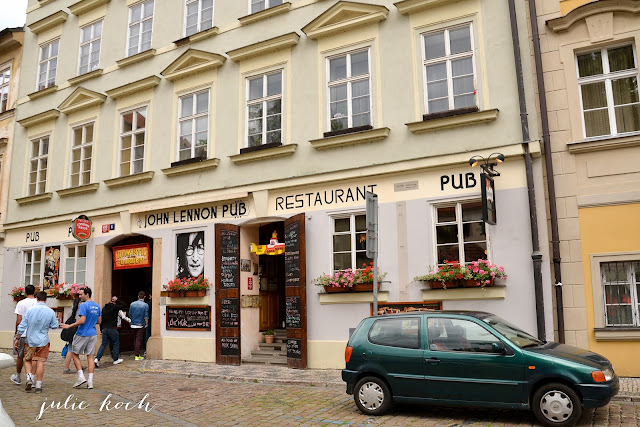 |
| We all live in a.....yeah, you get it. |
There was a concert going on in the Old Town Square. Live music isn't rare in Europe, but we love it! Just over from the Square, we found the Prague Astronomical Clock. Installed in 1410 A.D., it is the oldest astronomical clock still working. The clock includes the Apostles on its face, as well as the figure of Death.
Now we needed to be on the hunt for souvenirs. And then it happened...Rich found his version of heaven. A magnet store! A store full of nothing but magnets!! (And a man who apparently didn't understand why I was taking pictures...ha!)
 |
| Absolutely no idea. |
We woke up the next morning, packed up, and left Prague. The next place? Wellllll...
The Sedlec Ossuary (or Bone Church) is located in the lower level of the Church of All Saints in Kutná Hora, Czech Republic, about an hour east of Prague. From the outside the chapel looks relatively ordinary, aside from the skull figures adorning the outer wall of the grounds and the skull mosaic on the walkway as you enter the gates.
During the 13th century, this location was just a cemetery without a church. The King of Bohemia (at the time, this area of the Czech Republic fell under Bohemian rule) sent an abbot from the town's Cistercian monastery on a pilgrimage to Jerusalem. The abbot returned with some soil from Golgotha where Christ was crucified, and he sprinkled this dirt around the cemetery grounds. Once word spread that this was now sacred ground, this became a very desirable final resting place for thousands of people around Central Europe. In the 14th century, the church was built and the bones from disturbed graves were stacked in the vaults of the basement area, which was common during this time in history. The construction of the church, plus thousands of bodies arriving for burial from the Black Death and then the Hussite Wars, meant very little room left for traditional burials. Long story short, the monks began to bury the bodies for a number of years, then the bones would be exhumed, cleaned, polished, and stacked in the Ossuary.
By the 19th century, the Ossuary was overflowing with the bones of over 40,000 people, and some order was desperately needed. In 1870, a local artist, carpenter and woodcarver named František Rint, was hired to arrange the bones into a more orderly fashion. And, uh.........well, he did.
The Ossuary wasn't big, but oh boy was it packed full of tourists... There was a small admission fee, but I believe it was only a couple euros.
We ventured outside and circled the church, checking out the cemetery that surrounds it.
From Kutná Hora, we went to Český ráj, or Bohemian Paradise. Absolutely. Beautiful. And free! Great place to hike and just enjoy nature. There was a walkway leading down some stairs from the parking lot that reminded me a lot of Rock City in Chattanooga! ("Ha ha ha, I see Rock City!")
After walking through a very small portion of this very large nature reserve, we walked back up to Hrubá Skála Castle but there really wasn't much to see there, except some amazing views off the back veranda.
From here we drove into Poland--a new country for both of us!--for a very short while and then back into Germany. We stayed the night in Dresden, but before retiring for the night we had to walk around the city and get some dinner! I wasn't able to take many photos, though, as it was getting dark. Boooooo! Dresden is a very pretty city worth seeing.
We made it to the Katholische Hofkirche, or Cathedral of the Holy Trinity, just in time to witness a protest of some sort going on. Not sure what everyone was upset about, but there were vendors selling ice cream and lottery tickets in the mix. Cool. It was getting late and we were hungry so we didn't go inside, but it looked pretty!
We turned the corner to find a restaurant and saw this on the wall of a big building:
These were our first views. Beautiful, right? This was just the beginning. I had no idea what was in store for us.
As you can tell, it was a drizzly, dreary morning. The fog was swirling up from the canyon and it was magical.
I'm not sure if I prefer the photo below in color or black and white. What do you think?
See the tiny orange speck in the photo below? That's Rich on the overlook platform!
Again, photo below, tiny orange speck? My husband. Wayyy over there and wayyy up there. And this guy doesn't do well with heights!
Before we left, we each tried to toss a coin into the hole in the rock. We both missed!
Just one last stop before heading back to Wiesbaden! Off to Hof, Germany. (No, not this Hoff.)
The Fernwehpark in Hof is like a German version of the Signpost Forest on the Alaska Highway in the Yukon Territory! My brother and his family sent me pics of the Signpost Forest on one of their many drives from Georgia to Alaska and back, and someday I hope to visit it myself! Fernwehpark was started in 1999 and consists of several thousand signs, as well as stepping stones with handprints of Kevin Costner, Arnold Schwarzenegger, Denzel Washington, Cher, and many more.
I find it pretty extraordinary that these signs aren't covered in graffiti. Europe, especially Germany, is covered with it.
Rich found Oklahoma Street! Ooooooooooooklahoma!
The Austin sign is signed by Willie Nelson!
Roswell, Georgia! Boom!
Can you spot the Georgia tag below? I got super excited when I spotted this, even though it doesn't have a county on it!
Welcome to Texas!
And then there's this! Fulton County, dang!!
That wraps up this trip! We hope you enjoyed our adventure as much as we did!
Yep, those are human bones. But let me go ahead and say that in some unexpected way, this place did not feel scary to me at all. Eerie, yes. Different, definitely. But not scary.
The Ossuary wasn't big, but oh boy was it packed full of tourists... There was a small admission fee, but I believe it was only a couple euros.
We ventured outside and circled the church, checking out the cemetery that surrounds it.
 |
| I never, ever look at a daylily without thinking of my cousin, Rebecca. |
From Kutná Hora, we went to Český ráj, or Bohemian Paradise. Absolutely. Beautiful. And free! Great place to hike and just enjoy nature. There was a walkway leading down some stairs from the parking lot that reminded me a lot of Rock City in Chattanooga! ("Ha ha ha, I see Rock City!")
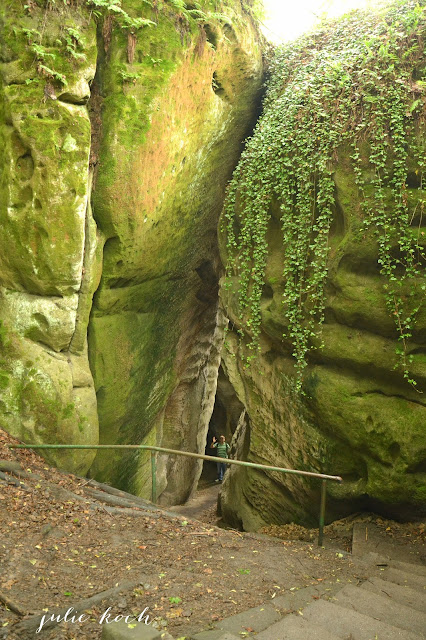 |
| See Rich?! |
After walking through a very small portion of this very large nature reserve, we walked back up to Hrubá Skála Castle but there really wasn't much to see there, except some amazing views off the back veranda.
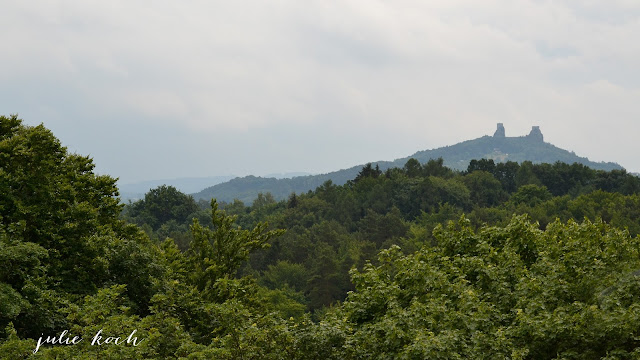 |
| Those two spires on top of that hill are the ruins of Trosky Castle. |
From here we drove into Poland--a new country for both of us!--for a very short while and then back into Germany. We stayed the night in Dresden, but before retiring for the night we had to walk around the city and get some dinner! I wasn't able to take many photos, though, as it was getting dark. Boooooo! Dresden is a very pretty city worth seeing.
The Frauenkirche Dresden, or Church of Our Lady, saw its beginnings in the 11th century as a Roman Catholic church. During this time, its location was outside the city walls and it was surrounded by a cemetery. Over the centuries, the building was repeatedly rebuilt in order to accommodate the growing congregation. After Reformation, the church became a Protestant one, the fortifications were moved to include the church within the city walls, and the cemetery was removed. An entirely new building was begun in 1722 because the original was in such bad condition. During World War II, the Frauenkirche wasn't bombed directly; however, the fire and heat caused from the surrounding area that was bombed spread to the building, setting the pews and galleries ablaze and eventually causing the breakdown of the supports to the dome. The ruins remained for almost 50 years before reconstruction began in using the plans from the 1722 rebuilding. The entire reconstruction process began in 1992 and was completed in 2005. If you didn't know the history of the church, you wouldn't guess that it isn't the original 300 year old structure. But upon closer inspection, you can pick out which parts were salvaged and reused.
The inside was stunningly beautiful. Photography wasn't allowed, but you can visit their website to see some of their photos as well as listen to some spectacular organ music!
 |
| Dresden Academy of Fine Arts |
We made it to the Katholische Hofkirche, or Cathedral of the Holy Trinity, just in time to witness a protest of some sort going on. Not sure what everyone was upset about, but there were vendors selling ice cream and lottery tickets in the mix. Cool. It was getting late and we were hungry so we didn't go inside, but it looked pretty!
We turned the corner to find a restaurant and saw this on the wall of a big building:
It's called Fürstenzug, and it's the largest porcelain mosaic in the world at 102 meters long. The 23,000 tiles of Meissen china depict the kings of the Wettin Dynasty, the ruling family of Saxony.
We finally found a very nice place for dinner and then went back to our hotel for the night. The next morning, we went to see yet another absolutely breathtaking place.
I wasn't prepared for the magnitude of the natural beauty here. It's called the Bastei and it's part of Saxon Switzerland National Park. No admission fee, which is unbelievable considering...
These were our first views. Beautiful, right? This was just the beginning. I had no idea what was in store for us.
The original Bastei Bridge was wooden and was built in 1824. I would NOT have wanted to cross that ravine 40 meters up on a wooden bridge! The replacement sandstone bridge was built in 1851, thank goodness.
As you can tell, it was a drizzly, dreary morning. The fog was swirling up from the canyon and it was magical.
I'm not sure if I prefer the photo below in color or black and white. What do you think?
See the tiny orange speck in the photo below? That's Rich on the overlook platform!
 |
| Elbe River |
Again, photo below, tiny orange speck? My husband. Wayyy over there and wayyy up there. And this guy doesn't do well with heights!
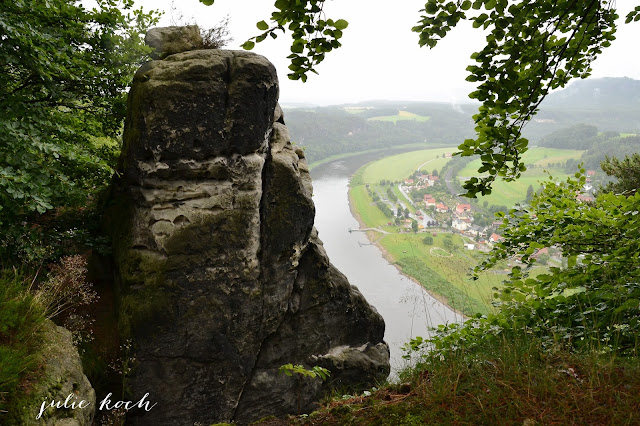 |
| Elbe River |
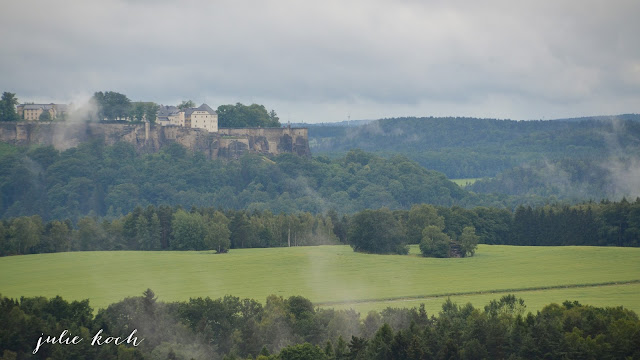 |
| Not sure what this place is, but I'm going to keep researching and hopefully find out! |
Before we left, we each tried to toss a coin into the hole in the rock. We both missed!
Just one last stop before heading back to Wiesbaden! Off to Hof, Germany. (No, not this Hoff.)
The Fernwehpark in Hof is like a German version of the Signpost Forest on the Alaska Highway in the Yukon Territory! My brother and his family sent me pics of the Signpost Forest on one of their many drives from Georgia to Alaska and back, and someday I hope to visit it myself! Fernwehpark was started in 1999 and consists of several thousand signs, as well as stepping stones with handprints of Kevin Costner, Arnold Schwarzenegger, Denzel Washington, Cher, and many more.
I find it pretty extraordinary that these signs aren't covered in graffiti. Europe, especially Germany, is covered with it.
Rich found Oklahoma Street! Ooooooooooooklahoma!
The Austin sign is signed by Willie Nelson!
Roswell, Georgia! Boom!
Can you spot the Georgia tag below? I got super excited when I spotted this, even though it doesn't have a county on it!
Welcome to Texas!
And then there's this! Fulton County, dang!!
That wraps up this trip! We hope you enjoyed our adventure as much as we did!

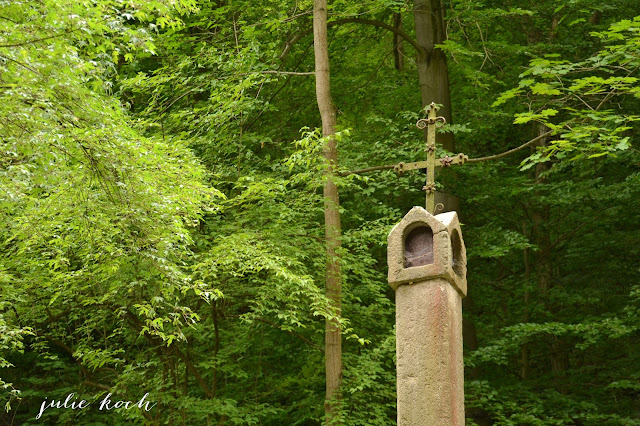













































































































































































Everything is so beautiful! What wonderful memories!
ReplyDeleteIt really is so beautiful here and we're so lucky to get to call this place home for a few years!
Delete